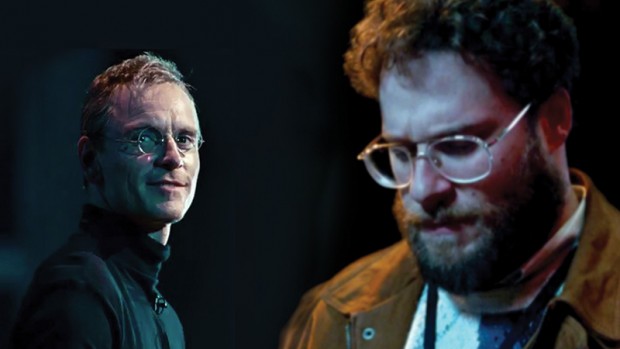Think Different: Steve Jobs (review)
Steve Jobs isn't afraid to bend the truth, and that's why it paints such a memorable portrait of the Apple mogul

A word of advice: don’t believe anything you see in Steve Jobs. This movie is not a biography. It’s an interpretation of a famous person’s accomplishments. The words “authoritative” and “accurate” and “fact check” do not belong in any discussion about it. If you see an article titled “What Steve Jobs Gets Wrong About X” — and you will, because the Internet is filled with bad ideas — don’t read it. It’s not worth your time.
Steve Jobs (![]()
![]()
![]()
![]() ) deserves much more than that. Director Danny Boyle and screenwriter Aaron Sorkin don’t try to capture Jobs as he was, or define his life and his intentions. They don’t paint him as a sinner or a saint. No, Jobs doesn’t get off that easily. They didn’t intend to sing gospels about him.
) deserves much more than that. Director Danny Boyle and screenwriter Aaron Sorkin don’t try to capture Jobs as he was, or define his life and his intentions. They don’t paint him as a sinner or a saint. No, Jobs doesn’t get off that easily. They didn’t intend to sing gospels about him.
Here’s what they did do, though: they adapted details from a nonfiction book, an honest-to-god biography written by Walter Isaacson in 2011, while also conjuring scenes and conversations wholesale from the make-believe corners of their minds. Fact and fiction, mixed together. Sorkin has called the script an “impressionistic” story, more similar to a painting than a photograph. The goal here isn’t mimicry. It’s cultivation.
That’s why it’s so tempting to pretend Boyle and Sorkin hit their mark. Think of the tepid Hollywood biographies that, just in the past year alone, dribbled out to audiences: American Sniper, The Theory of Everything, Get On Up, and on and on and on. These movies exist to imitate actual lives, to remix facts into entertainment. Steve Jobs does something else entirely, something much more ambitious. The ambivalence it has toward Jobs (Michael Fassbender) never quite blends — especially when the finale embraces a tidy reunion with his estranged daughter Lisa (Perla Haney-Jardine) — but it’s doing something different. That’s enough to make it one of the season’s most daring films.
Thank Aaron Sorkin for that. The Moneyball scribe ditches almost every element of conventional storytelling, transforming Isaacson’s book into a tightly focused presentation of Jobs’ rise, fall, and return to Apple Computer. It’s a traditional narrative arc, of course — climb the mountain, fall into the valley, then finally reach the summit — but it’s framed within three highly original acts, which Boyle stitches together with characteristically slick montage work.
In other words, it’s an unlikely creation myth. Steve Jobs ends before Apple Inc. became the largest company in the world. No iPod! No iPhone! No iPad! These world-changing gadgets never appear in Jobs’ hand during the movie — perhaps because they don’t have to. Anyone who watches Steve Jobs will think about what comes after the credits roll. We still live in that world; we don’t need to see it on screen. Fassbender does slip into a prerequisite black turtleneck and dad jeans by the third act, though. The man must evolve into his own legend.
As structured by Sorkin, each act follows a similar pattern. Minutes before Jobs is set to introduce a new Apple product in front of a delirious audience, he faces off backstage against his friends, family, and colleagues. The usual suspects include his confidant Joanna Hoffman (Kate Winslet), Apple co-founder Steve Wozniak (Seth Rogen), Apple CEO John Sculley (Jeff Daniels), Macintosh developer Andy Hertzfeld (Michael Stuhlbarg), and his ex-girlfriend Chrisann Brennan (Katherine Waterston). The conflicts unfold in real time, all at an absurdly reliable clip. “It’s like five minutes before every launch, everyone goes to the bar and then tells me what they really think of me,” Jobs quips in the only movie’s sole self-deprecating moment.
When each argument erupts — always because Jobs wants something, or Jobs believes he is right, or Jobs refuses to apologize — the character’s famously intense focus comes into relief. Pay careful attention to where he allows it to go, where he doesn’t, and the tremendous effort a person spends to attract his attention. Fassbender’s Jobs is always battling to maintain control, even as he’s talking with his nine-year-old daughter.
The relationship between Jobs and Lisa is the beating heart of the movie. In 1984, he refuses to acknowledge that she is his daughter. In 1998, he refuses to pay her tuition to Harvard. During the years between, Jobs tentatively invites her into his life — but always at arm’s length. He is a cruel and controlling parent, sensitive to his daughter’s pettiest sleights, and only attempts to patch their relationship as it’s on the verge of crumbling apart.
The movie’s strongest scene comes late in its third act, as Fassbender and Haney-Jardine face off in a hallway lined with Apple’s “Think Different” advertisements. Minutes earlier, a glimmer of doubt leaked out from beneath Jobs’ persona, a wound opened by a blitz of criticism from Hoffman, Wozniak, and Hertzfeld about his ego and selfishness. When he finally sees Lisa — or rather, when she finally agrees to let him see her — she steamrolls him.
“Why’d you say you weren’t my father?” she demands to know. It’s the defining question of the movie, and it has absolutely nothing to do with Apple. His answer is as close to honesty as he gets: “I’m poorly made.” And that’s when, just for a moment, Steve Jobs accomplishes the unthinkable. It transformed the myth back into a man.
Steve Jobs is Rated R and runs 122 minutes. Opens Friday at Landmark’s new Atlantic Plumbing Cinema and other area theaters.
Support Metro Weekly’s Journalism
These are challenging times for news organizations. And yet it’s crucial we stay active and provide vital resources and information to both our local readers and the world. So won’t you please take a moment and consider supporting Metro Weekly with a membership? For as little as $5 a month, you can help ensure Metro Weekly magazine and MetroWeekly.com remain free, viable resources as we provide the best, most diverse, culturally-resonant LGBTQ coverage in both the D.C. region and around the world. Memberships come with exclusive perks and discounts, your own personal digital delivery of each week’s magazine (and an archive), access to our Member's Lounge when it launches this fall, and exclusive members-only items like Metro Weekly Membership Mugs and Tote Bags! Check out all our membership levels here and please join us today!



























You must be logged in to post a comment.